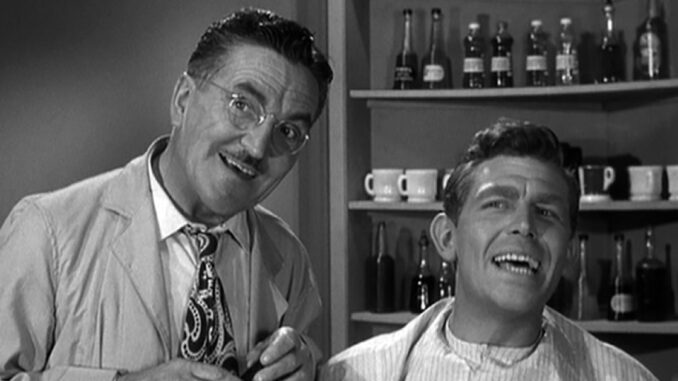
In the tranquil, sun-dappled haven of Mayberry, where the most pressing issue was often the whereabouts of Opie's lost fishing lure or the judicious selection of pie at the church bake sale, life flowed with a rhythm as predictable and comforting as the creak of Andy Taylor’s porch swing. And at the very heart of this gentle cadence, a human metronome of local lore and deliberate living, stood Floyd Lawson, the barber. His struggle with the new Mayberry doctor wasn't a clash of wills, nor even a true rivalry, but rather a profound, almost cosmic dissonance between two utterly different worlds trying to occupy the same small, harmonious town.
Floyd’s barbershop was more than a place for a trim; it was a sanctuary, a confessional, a newsroom, and an informal clinic all rolled into one. Here, ailments were diagnosed with a discerning eye and treated with a comforting blend of common sense, neighborly advice, and perhaps a peppermint stick. A persistent cough might be cured by a "good sit" and a dose of Mrs. Wiley's elderberry syrup. A creaking knee was best remedied by "less stairs and more quiet thinking." Floyd knew every ache and pain, every family history, every underlying worry that manifested as a nervous twitch or a pallid complexion. His diagnostic tools were observation, empathy, and an encyclopedic knowledge of Mayberry’s entire population, all administered with the soothing snip-snip of his shears.
Then came the new doctor. Let's call him Dr. Aris Thorne. Dr. Thorne arrived in Mayberry not with a horse and buggy, but a gleaming, slightly too-large automobile. He brought with him a degree from a prestigious university, the latest medical journals, and a set of values alien to Floyd’s Mayberry. His office, unlike Floyd’s warm, chatty space, was pristine, efficient, and, to Floyd’s mind, utterly devoid of soul. It smelled not of Bay Rum and stale pipe tobacco, but of antiseptic and progress.
The struggle, therefore, manifested on multiple, often unspoken, levels. Firstly, there was the clash of pace and presence. Floyd operated on Mayberry time, which meant an appointment could stretch into an hour-long exchange of pleasantries, gossip, and philosophical musings before a single hair was cut. The doctor, however, was tethered to a schedule, to ten-minute slots and the cold hard fact of billable hours. When Floyd, ever the conversationalist, tried to engage Dr. Thorne in a leisurely chat about the vagaries of the weather or the surprising quality of Otis Campbell's latest batch of moonshine, the doctor would invariably pivot back to symptoms, pulse rates, and the next patient waiting. To Floyd, this felt brusque, even rude; to Dr. Thorne, it was simply professionalism.
Secondly, the philosophies of healing were diametrically opposed. Floyd, the practitioner of folk wisdom, understood illness as a holistic experience, intertwined with one’s emotional state, one’s diet of daily gossip, and one’s spiritual well-being. He’d recommend fresh air and a good laugh for the blues, or a strong cup of sassafras tea for a sniffle. Dr. Thorne, on the other hand, saw the body as a complex machine. His remedies involved Latin names, prescriptions, and the sterile hum of a brand-new X-ray machine. When Floyd would gently suggest that a case of "the nerves" might be helped by a visit to Aunt Bee’s kitchen for some comfort food, Dr. Thorne would meticulously explain the intricacies of serotonin reuptake inhibitors. It wasn't that the doctor was wrong, but his approach utterly bypassed the comforting, human-centered remedies that were the very bedrock of Mayberry’s self-care.
Thirdly, and perhaps most subtly, was the diminishment of Floyd’s role in the community. For decades, Floyd had been the unofficial health monitor of Mayberry. He’d spot a tremor in a hand, a new cough, or a distant look in someone’s eye, and gently inquire, offering unsolicited advice that, while not medically sound, was always offered with genuine care and concern. He knew who was prone to chilblains, who had a weak stomach, and who was "a bit low" after the last county fair. The doctor, with his official authority and modern equipment, unwittingly rendered Floyd’s intuitive, homespun diagnostics obsolete. It wasn’t a malicious act, but the cold, hard fact of progress. Floyd was no longer the first port of call for a Mayberry malaise; that privilege now belonged to the man with the stethoscope and the framed diplomas.
So, Floyd struggled. He struggled to understand a world where healing was clinical and detached, where conversations were brief and to the point, and where the human touch seemed less important than the latest scientific breakthrough. He might nod politely as Dr. Thorne lectured on cholesterol, but his mind would drift to the perfect consistency of a homemade chicken noodle soup, a far more comforting balm for any ailment. His struggle was the struggle of old Mayberry itself – gentle, traditional, deeply human – facing the inevitable, sometimes unsettling, march of modernity. And as Floyd continued to offer his whispered advice and gentle snips, one could almost hear the faint, melancholic echo of a bygone era, slowly fading in the antiseptic tang of a brand new day.